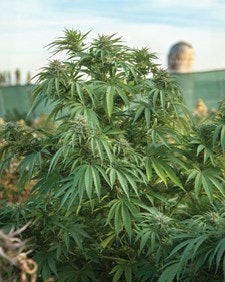
In fiscal year 2015, Washington brought in nearly $260 million in sales and nearly $65 million in taxes, according to the state’s Liquor and Cannabis Board (LCB). The state sells an average of nearly $2.5 million in cannabis every day. At that rate (and ignoring the extreme likelihood—based on the current five-fold increase in daily sales over the course of a year—that sales will continue to climb), The Evergreen State can expect sales of about $75 million a month and $900 million in the next year.
Since Washington legalized marijuana with the passage of I-502 in November 2012 through to the state’s first retail marijuana sales in July 2014, and actually long before both of those victories, Kevin Oliver has been at the front and center of the marijuana legalization movement and regulatory implementation process. As executive director of NORML Washington—the state affiliate of the National Organization for the Reform of Marijuana Law (NORML)—he has worked with consumers and cannabis businesses throughout the state to make sure their interests are represented as regulations develop and evolve.
And as a marijuana cultivator (he co-owns Washington’s Finest Cannabis with his wife), he joined the ranks of what is now 81 producers, 507 producer/processors, 25 processors and 187 retailers licensed in the state (per the 502data.com website), who have experienced the good and bad (such as high taxation, and a bit of a bumpy start with supply not ready to meet to demand) that went along with being part of one of the first two states to legalize recreational marijuana use by adults and establish a regulated, taxable marketplace around it.
Here, Oliver talks with CBT Editor Noelle Skodzinski about regulatory changes that have impacted Washington’s medical and recreational cannabis landscape, particularly a much-needed shift in the tax structure and the passage of SB 5052, which, among other things: made the quality- and safety-assurance regulations established for retail businesses under I-502 applicable to medical marijuana establishments; established further patient protections against federal law and allowed for medical cooperative gardens; and required the LCB to allow more marijuana retail outlets. He also shares his insights into significant regulatory changes regarding municipal bans on marijuana businesses—which, should they become a reality, will resonate on a national level with implications for other states that may follow in Washington’s footsteps. But most of all, Oliver brings to light some of the ongoing challenges he faces as a cultivator in a continuously evolving marketplace.
Noelle Skodzinski: SB 5052 took effect in late July. What impact have the changes had, particularly regarding the medical marijuana program’s integration into the recreational program (under I-502)?
Kevin Oliver: One of the most notable impacts ... is that dispensary owners have finally taken notice of the legislature’s intent to regulate the currently unregulated “medical” storefront access points. I say “finally” because the full legislature ... had already approved regulation in 2011 with SB 5073. However, the governor at the time, Christine Gregoire, vetoed most of that bill.
The new legislation states that any storefront selling pot in Washington must be licensed by the Washington State Liquor and Cannabis Board by July 2016. In the meantime, most municipalities that have allowed unregulated storefronts to operate have continued to allow them to operate, in lieu of licensure.
NS: Cultivators recently got a major tax break. What happened and what has the overall impact been?
KO: Prior to the passage of HB 2186 this legislative session, marijuana producers, processors and retailers were each taxed 25 percent on their transactions. Basically, every time marijuana changed hands along the supply chain, there was a 25-percent tax levied. Now, with the enactment of HB 2136, there is only one tax level, presently at 37 percent, and it is paid ... by the consumer. This tax collapse, [plus] an increase in supply, has resulted in lower prices from producers, which is passed along as lower prices for consumers.
NS: Are any other regulatory changes in the pipeline that we can expect to see this year or in 2016?
KO: From a regulatory standpoint, the Washington State Liquor and Cannabis Board lifted the cap on the number of licensed retail outlets it will allow in the state. The application process [at press time, was scheduled to begin] Oct. 12, and there is currently no limit on the number of stores that will be allowed. Likewise, all producers have been given the opportunity to activate an additional 30 percent of their [plant] canopy allowance.
Also, 2016 will likely see a Washington Supreme Court decision reversing the bans and never-ending moratoria that have been enacted contrary to state law by some municipalities.
NS: Washington has seen a reversal from an initial supply shortage and high prices in 2014 to excess supply and consequently lower prices. As a grower, has this affected you?
KO: Our business plan for Washington’s Finest Cannabis was to keep overhead low, knowing there would be an increase in supply and a tightening of margins. Quality over quantity is a priority, especially from a consumer perspective. So, as a producer, I want to provide the best quality at the lowest price possible.
NS: How do you remain competitive?
KO: We know that the retailer and, ultimately, the consumer, is the most important consideration. ... To that end, we [focus] on the consumer experience. We feel that our all-natural, pesticide-free products are more enjoyable, more satisfying and healthier over time.
I made the decision early on to offer only a few strains and to preserve those phenotypes for a consistent product, asking myself, “If I was alone on a deserted island with only one strain to get me high, what would that be?” I ended up with a few [distinctive] heirloom strains.
NS: What’s the biggest challenge NORML Washington members face?
KO: NORML is a consumer lobby. ... That means advocating for changes that allow responsible adult marijuana users protection from prosecution. The biggest challenge facing anyone interested in marijuana reforms and regulations in Washington state right now is keeping up with the subtle, ongoing changes in the state laws.[A main point] of contention for consumers ... is their inability to ... grow a few plants for personal use. However, I believe that option will be available ... in the next few years, as our conservative voters come to understand that a home grow component is the final nail in the black market’s coffin. Washington NORML is working with key legislators to develop strategies to incorporate home grow into our laws.
NS: What’s your biggest challenge as a cultivator?
KO: Scaling up to meet the requirements of commercial cultivation is a demanding task. The learning curve has been both exponential and invaluable at the same time.Obstacles [also] have arisen from those regulations that would restrict marijuana businesses from thriving, such as municipalities that have enacted ... bans for marijuana business, contrary to state law.
However, the biggest challenges are zoning and building code restrictions.
For instance, the agencies governing state building codes are suggesting regulations that unnecessarily restrict both the growing of over 15 plants and/or processing of any type—even if it is just trimming and packaging of dried marijuana—to industrial structures with an “F1” building rating [for high hazard, industrial use]. This would eliminate growing in agricultural areas with greenhouses or hoop houses, as well as [preventing] a farmer, or producer, from trimming or packaging on their property. These regulations are not being suggested for any other industry ... that grows plants or food.

NS: What was the best business decision you’ve made as a grower?
KO: As owners of Washington’s Finest Cannabis [my wife and I] did not dilute our ownership by taking on investors or borrowing money.NS: What keeps you awake at night?
KO: Prior to legalization, I would have told you that having a medical recommendation that provided an affirmative defense for growing 15 plants kept me awake ..., thinking I may be raided ... at any time. Today, ... I sleep better, knowing I am operating within the clear, bright lines of legalization.
That said, thinking about the possibilities of operating a small business in a new industry, there have been many restless nights.
















